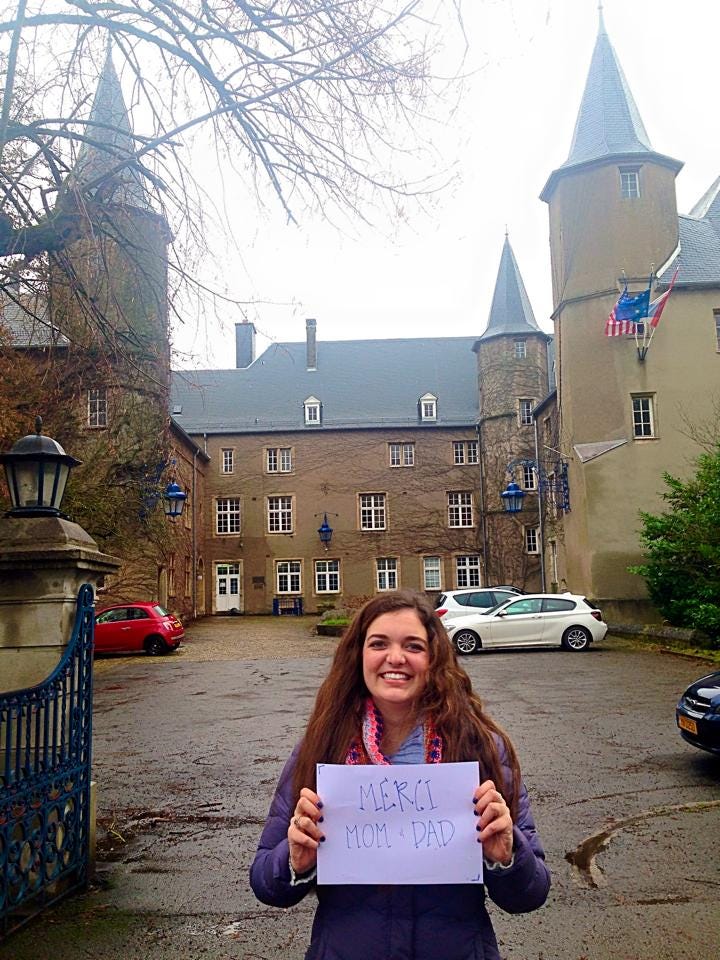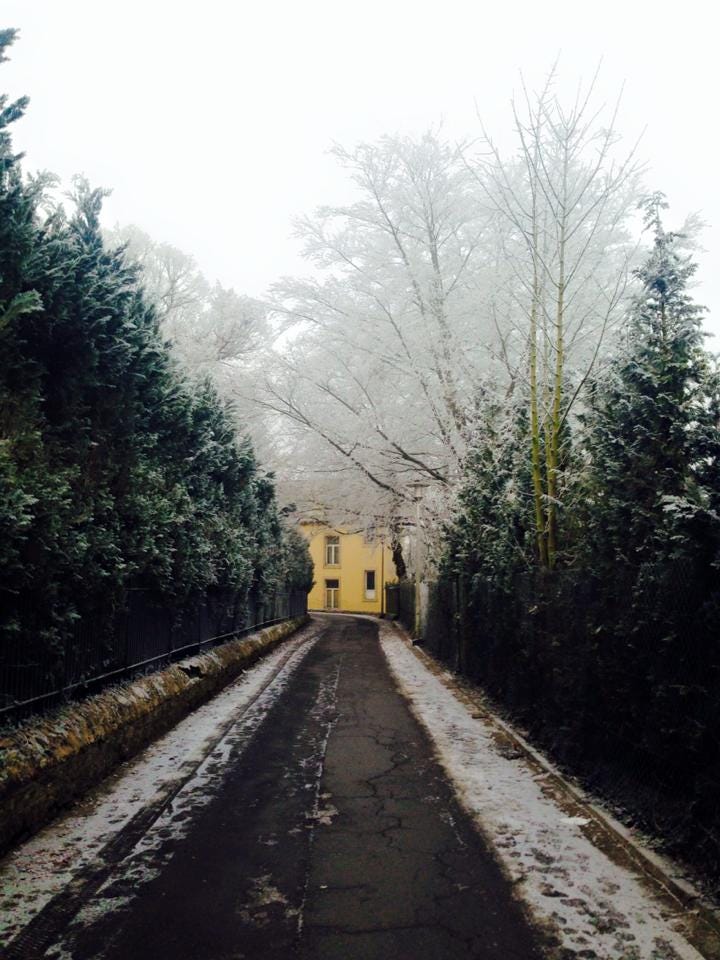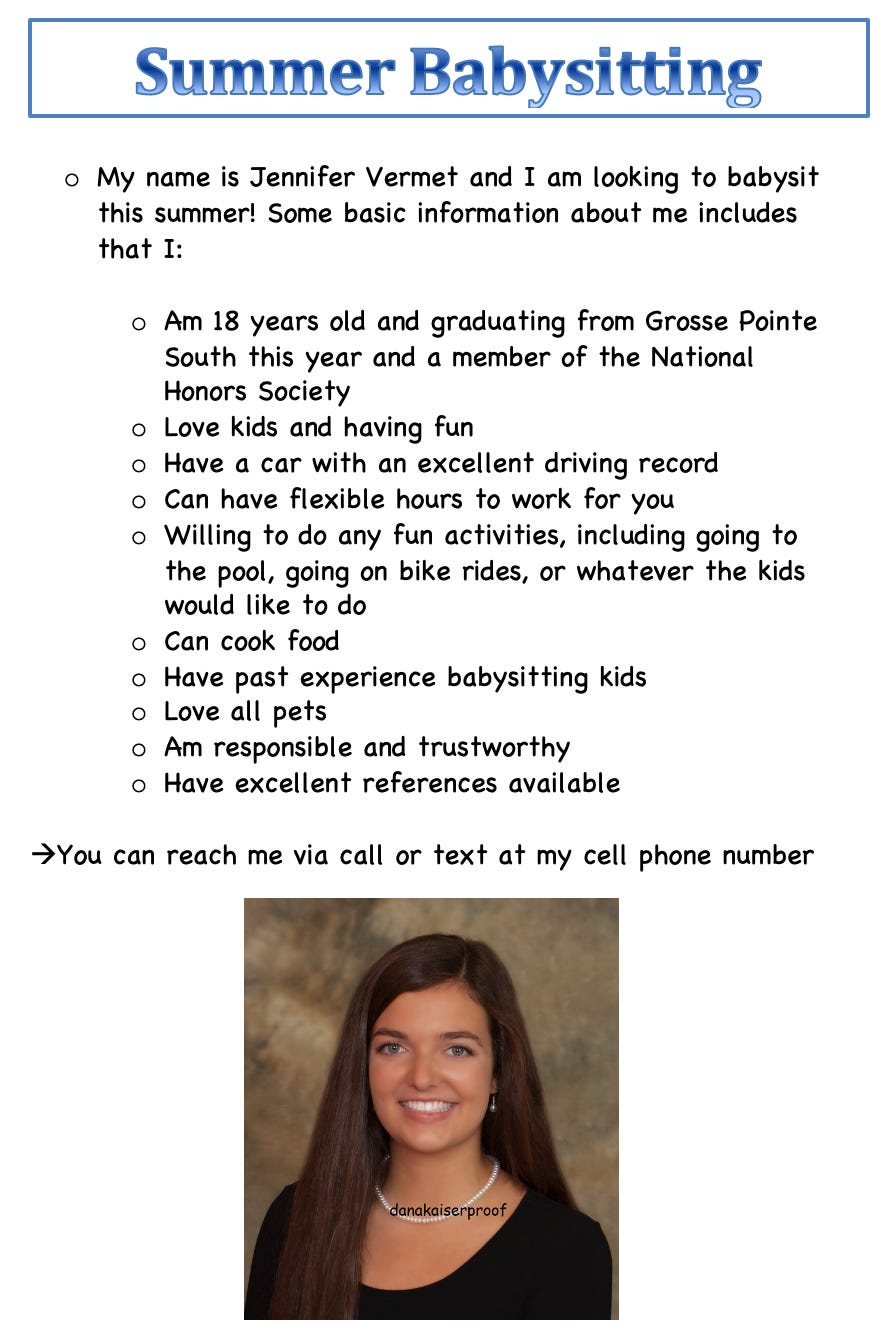🌟 Letter 44 from a learn-it-all 🌟
Taking a walk in the shoes of my eighteen-year-old self 👟👟
Hello fellow learn-it-all,
Greetings from Chicago!
I am going to try something out differently for this newsletter and look back at a version of myself from six years ago. I rarely use Facebook but when I went on today it showed me a memory that stood out to me from my past life experiences. Usually, it ends in a whirling pit of nostalgia. This time around I viewed it as a reflective state that I realized an inflection point in my life.
As always I am open to your suggestions as I try out this newer layout to include more of my own writing with fewer links. I’d love to know as you read this what you think, so I’d love if you dropped me a line by responding to this email or leaving a comment below:
If you are new here or missed last week's edition, you can catch up on the past letters here. If you are reading this for the first time, I’d love you to sign up below to join the 179 learners:
Now, let’s dive into letter 44 from a learn-it-all. Enjoy!
📷 Photo of the Week
Six years ago my Mom and Dad afforded me the opportunity to study abroad for the first time. I am forever thankful to this day for this experience! This picture is in front of the Differdange Castle in southern Luxembourg. It is used by Miami University to host programs.
This was my first time leaving the country without my parents. I remember my mom calling me about gazillion times after I left her at the security gate. She had just realized that I am leaving the country without her. I was 18 and felt beyond empowered by the freedom of what was ahead. I was nervous at the same time, but I recall thinking about my Omi and it gave me extra courage to push past any doubts I had about this 3 weeks trip ahead. It crystallized the fact that I LOVE new experiences and adventures.
When I arrived in Luxembourg, I met my host mom in her Fiat and I had never been inside such a small car. My suitcase barely fit and I was embarrassed as she asked if I was moving there longterm. As we drove out of the parking lot, I saw a sign that said "Sortie" that I knew from my schooling throughout the years French growing up "sortir" means to go out or exit. I got excited that I epically failed at doing research on Luxembourg prior to arriving. I had no idea that Luxembourgish was so similar to French. My host mom, Anna casually mentioned how she knew six languages and acted like that was normal. Wow! I don't know many people who knew that much.
There was an itinerary with what we'd learned in class each day about Civil Rights but the rest was unknown. It was left up to the serendipity of my classmates of where and what we'd spend our free time doing.
Spoiler alert: there wasn't much happening in Differdange. Most folks go to quietly retire there. It reminded me of the Florida of the US.
Much of my fun excursions all started taking the train to many places. It was so cheap! We went downtown to Luxe city often for fine dining where I fell in love with gnocchi and chocolate spoons you dip in hot milk. The boots of beer were fun as well.
It cost only 9 euros to take the train to a separate country to Trier, Germany. I discovered pink wine called rosé (big shocker) and was enthralled with how great it was with its sugar. On a school night, I learned all-you-can-drink wine tasting is a dangerous move.
On a Tuesday night, I discovered that Metz, France was a ghost town. That meant better customer service for me while meandering around the shops. I learned how to not miss my train with 7 minutes to spare between stops from Brussels to Amsterdam.
The first two weeks I had a class in Luxembourg and the final week we traveled with Professor Gaskins to London. What a city. It was one of the most unique places that I had ever been to in comparison to growing up in a small town and attending university being surrounded by corn fields. It felt surreal. The Tube frightened me and my claustrophobia and how far down we would go to take the train. The map with all of the zones seemed never-ending. I grew an obsession with fish and chips. It was my first time ever drinking cider beer. I never knew it could be so tasty.
My cohort of students attended a lecture at the London School of Economics. We got horrendously lost and missed half of it, so I was completely confused once we sat down. It was something about the Cold War. The cool part was the opportunity after with free wine and cheese to talk to the professor and other students after. I had never had so much fun at a school event!
All in all, I am not going to lie, it was easy to get carried away with being within the legal drinking age this first trip abroad. I felt much more mature not feeling stigmatized to drink a beer with my fish and chips.
I was scared going into the trip being the youngest at only age eighteen, but I truly learned how to lean into my adventurous side. It was a 3-week experiment that gave me the courage my following years in university to know that it wasn't long enough. Homesickness was never a thought on my mind.
If you liked this story or have other thoughts, let me know because I would love to hear from you from an email response or a comment below 😊
🤔 Reflecting
That same eighteen-year-old Jen was a nanny the summer prior to beginning college. Below is the ad that helped me get this great job.
If I were to remake this, so much would be different. You have to start somewhere though. I remember thinking about what made my babysitters so great growing up and tried to portray that same value proposition here.
I had a primitive marketing funnel for these ads. I printed them out and had my Dad give them out to his patients. It landed in success and this experience looked great on my resume for the next summer when I was a sailing coach to 6-17-year-olds.
Key learning: it's not until you have a first version that you can begin to improve. Just start and iterate from there.
📖 Reading
I read The Art of Decision-Making essay written by Joshua Rothman from The New Yorker. It was intriguing to compare and contrast the different methods that leaders of the past like Darwin made their decisions. This is an analysis of decision theory. The six themes that I found most provoking were:
Questioning whether we are in charge of the ways we change. Are we the readers or the writers of our own stories?
Decision theory is the destination that we've arrived at after converging ideas to make a choice. The most sound decisions flow from values. When asked whether to major in finance or in creative writing, we first ask ourselves what we value. After we try our best to maximize that value. From this example, a decision is a value-maximizing equation.
If we are not maximizing our values then we could be opting for them. This means to shift our values for a change that we think our future self would value more than our present self. For example, your present self may not really value kids but Darwin opted to have ten kids because he knew that his future self would value them despite impeding his present scientific career.
Self-transformation happens when you try out the values of someone you might admire. An old version chooses to be a new version. If you sign up for a class in you want to want to like classical music. You aspire and hatch plans with it being a hobby but you're not sure until you try.
Being ambitious vs being aspirational. For example: when I took this writing course in November 2019, I set my bar low. I was hoping that I would write and publish at least 1 article to put on a website I was afraid to make. I never knew a year later that would accumulate to thousands of words or starting a freelancing business. We feel like a phony if we try to start out with too high of ambitions so we see them as aspirations. We need to embrace that feeling like a phony.
Vegemite Principle: if you’ve never tasted Vegemite, a mysterious and beloved Australian “food spread” made from brewer’s yeast, then neither a description of what it’s like (black, gooey, vegetal) nor experience with other spreads (peanut butter, marmalade, Nutella) will tell you whether you’d like it. There is no rational way to overcome this dilemma.
“Everyone goes to college ‘to become educated,’ ” Callard observes, “but until I am educated I do not really know what an education is or why it is important.” If we couldn’t aspire to changes that we struggle to describe, we’d be trapped within the ideas that we already have. Our inability to explain our reasons is a measure of how far we wish to travel. It’s only after an aspirant has reached her destination, Callard writes, that “she will say, ‘This was why.’ ”
💭 Pondering
We never can predict exactly what our future selves want. But by having a hypothesis, we are much more likely to find out in hindsight how well we know ourselves.
👩🏫 Course Managing
The fun officially began this past week with the course launch of Revitalize your career. The energy was high thanks to playing U2 at the beginning of each session. We added some levity with some clips from the Office. The discussions in the breakout rooms were rich.
The sessions this past week centered around adopting a product mindset and taking the reins of your career. This partnered alongside the power of personal branding and the doors to unthinkable opportunities that can be made from showcasing yourself on the Internet.
It's inspiring to share these ideas and start to see students brainstorm about their own unique intersection of skills and interests. We started to see students think about the potential in their careers differently. It's helped them to realize the importance of storytelling.
Overall the course has been off to such a great start with such a close warm environment among the guides and the students. We've left 30 minutes for questions and answers at the end of the curriculum each time and nearly everyone stays for the discussions.
🔎 Word to define
Aide-mémoire: a memory-aid; a reminder or memorandum, especially a book or document serving this purpose" An aid to the memory especially a mnemonic device. A written summary or outline of important items of a proposed agreement or diplomatic communication.
Etymology of the word: It comes from the mid-19th century French intersection of the to words: aider (to help) and mémoire (memory).
Example: Perhaps getting inventive with what we care about can partner with our brains by creating an aide-mémoire. For instance, in 2021, I value having PIE: play, intentionality, and experiments.
🌟 Quote to inspire
"You learn something every day if you pay attention.” - Ray Le Blond
❓ Question to think about
What do you admire most about your eighteen-year-old self?
I appreciate you reading this! If certain ideas resonated or you have feedback to improve my future newsletters, I’d love you to leave a comment, reply to this email, or send me a message on Twitter @JenVermet.
Never stop learning 🌟
Until next week,
Jen
If you’re reading this because someone shared this newsletter with you or you clicked a link somewhere, welcome! I’d love it if you subscribed below to receive future updates:






This was a great read Jen. I was like 'OMG, that's Differdange!' I lived very close to there for 7 years, in a little village called Sanem (Lux: Suessem). We left in 2008. I wonder if we were there when you travelled there. I have no idea how old you are, so we might have been. Maybe we even walked past each other in the city centre!